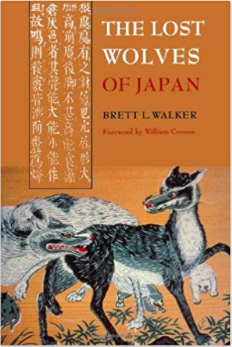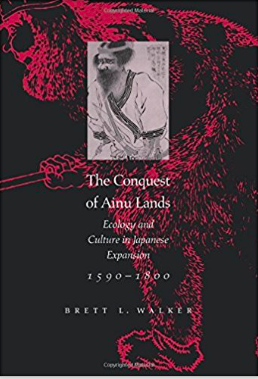AVAILABLE SOON

Yukikaze's War: The Unsinkable Japanese Destroyer and World War II in the Pacific. Forthcoming from Cambridge University Press in Spring 2024.
NOW AVAILABLE

A Family History of Illness: Memory as Medicine. Seattle: University of Washington Press, 2018.
Description:
While in the ICU with a near-fatal case of pneumonia, Brett Walker was asked, "Do you have a family history of illness?"—a standard and deceptively simple question that for Walker, a professional historian, took on additional meaning and spurred him to investigate his family's medical past. In this deeply personal narrative, he constructs a history of his body to understand his diagnosis with a serious immunological disorder, weaving together his dying grandfather's sneaking a cigarette in a shed on the family's Montana farm, blood fractionation experiments in Europe during World War II, and nineteenth-century cholera outbreaks that ravaged small American towns as his ancestors were making their way west.
A Family History of Illness is a gritty historical memoir that examines the body's immune system and microbial composition as well as the biological and cultural origins of memory and history, offering a startling, fresh way to view the role of history in understanding our physical selves. In his own search, Walker soon realizes that this broader scope is more valuable than a strictly medical family history. He finds that family legacies shape us both physically and symbolically, forming the root of our identity and values, and he urges us to renew our interest in the past or risk misunderstanding ourselves and the world around us.
Reviews:
"Profoundly intimate and unsettling. A Family History of Illness weaves together family histories with the history of science, medical history, and a history of place."
-NANCY LANGSTON, professor of environmental history, Michigan Tech
"A masterful tale, beautifully written, by a highly accomplished historian at his best. A Family History of Illness is a unique story that brings together personal memoir and medical history with a thoughtful guide and reflection on the craft of history."
-GREGG MITMAN, author of Breathing Space: How Allergies Shape Our Lives and Landscapes
"A uniquely talented historian fights the disease that may kill him with research, narrative, and empathy. The result is a moving memoir and profound meditation on living within the histories of our body, family, and environment."
-DAVID ARMITAGE, Harvard University
"In another tour de force, Brett Walker traces the entangled social and biological histories that produced his own medical condition and then uses this lens to show how all our histories are thus entangled. The result is a rousing defense of history itself in our age of presentism."
-JULIA ADENEY THOMAS, author of Reconfiguring Modernity: Concepts of Nature in Japanese Political Ideology
"This book is terrific in five ways I can barely list here. Fascinating, literate, profound, wondrously variegated, harrowingly personal. Brett Walker, a historian with an eye for science and an ear for language, knows that he and his near-death experience are a synecdoche for the broader issues of disease, memory, selfhood, and history among us all."
-DAVID QUAMMEN, author of Spillover

A Concise History of Japan. Cambridge: Cambridge University Press, 2015.
Description:
To this day, Japan's modern ascendancy challenges many assumptions about world history, particularly theories regarding the rise of the west and why the modern world looks the way it does. In this engaging new history, Brett L. Walker tackles key themes regarding Japan's relationships with its minorities, state and economic development, and the uses of science and medicine. The book begins by tracing the country's early history through archaeological remains, before proceeding to explore life in the imperial court, the rise of the samurai, civil conflict, encounters with Europe, and the advent of modernity and empire. Integrating the pageantry of a unique nation's history with today's environmental concerns, Walker's vibrant and accessible new narrative then follows Japan's ascension from the ashes of World War II into the thriving nation of today. It is a history for our times, posing important questions regarding how we should situate a nation's history in an age of environmental and climatological uncertainties.
Reviews:
2015 Choice Outstanding Academic Title
“This is the best short survey of Japanese history available today: timely in its focus on environmental issues but timeless in its sound scholarship, rich in detail but thoroughly readable and eloquent in its interpretation of Japan’s complex past.” WILLIAM M. TSUTSUI, Hendrix College, Washington
“This is a textbook for our times from one of the leading scholars in the field. From humanity’s deep history in the archipelago to the massive crisis of March 2011, Walker’s history recasts the central themes of the Japanese past. Samurai scientists, wartime zealots, and the nation’s vibrant post-war popular culture are placed in global context and enlivened through clear prose. Each chapter is concise, accessible, and rooted in the latest scholarship. I can think of no finer text that covers the full range of Japan’s past.” IAN JARED MILLER, Harvard University
"In crisp, clear prose, Brett Walker's Concise History provides a sweeping view of Japan's past distinctively framed by world history and, most crucially, by environmental challenges." JULIA ADENEY THOMAS, University of Notre Dame
“Brett Walker’s Concise History of Japan is a new national survey geared to the global Anthropocene. Alert to the many forces that threaten our planet’s future, the author—a leading environmental historian in his own right—takes a critical look at the long sweep of the Japanese past. The result is a fast-paced account of the archipelago’s development and its discontents, at once brisk and brooding.” KÄREN WIGEN, Stanford University
"Walker’s new history of Japan reflects a deep appreciation of the issues of concern to today's readers. This is a history of Japan unlike anything published so far in the attention given to the impact of disease, famine, deforestation, climate change, environmental pollution, and natural disasters on the story of the Japanese and their relationship with their country. In a clear, readable style, the author expertly narrates the course of Japanese history, reflecting the most recent scholarship available." -- Choice
"This belief [in the historical importance of climate change] has led to a lucid exploration of the ways that the peoples of the Japanese archipelago have shaped and been shaped by their environment, from the extinction of big game to the grave disasters and diseases that accompanied industrialization every step of the way." -- Times Literary Supplement

Toxic Archipelago: A History of Industrial Disease in Japan. Seattle: University of Washington Press, 2010.
Winner of the 2011 George Perkins Marsh Prize for Best Book in Environmental History
Description:
Every person on the planet is entangled in a web of ecological relationships that link farms and factories with human consumers. Our lives depend on these relationships - and are imperiled by them as well. Nowhere is this truer than on the Japanese archipelago.
During the nineteenth century, Japan saw the rise of Homo sapiens industrialis, a new breed of human transformed by an engineered, industrialized, and poisonous environment. Toxins moved freely from mines, factory sites, and rice paddies into human bodies.
Toxic Archipelago explores how toxic pollution works its way into porous human bodies and brings unimaginable pain to some of them. Brett Walker examines startling case studies of industrial toxins that know no boundaries: deaths from insecticide contaminations; poisonings from copper, zinc, and lead mining; congenital deformities from methylmercury factory effluents; and lung diseases from sulfur dioxide and asbestos.
This powerful, probing book demonstrates how the Japanese archipelago has become industrialized over the last two hundred years - and how people and the environment have suffered as a consequence.
Reviews:
“Toxic Archipelago is an uncomfortable, but nonetheless compelling, read. Although the author tells it as he sees it, the book is well written and offers a reasoned and persuasive argument (albeit one sided) that certainly delivers strong messages. The book is substantially referenced, deftly grounded in the historiography and illustrated with black and white images, tables and charts. The structure of the monograph makes it possible to dip into the text; however, the originality and depth of the research clearly merit a cover-to-cover exploration. Toxic Archipelago will be of specific interest to environmental and medical historians at undergraduate levels and beyond.” – The Social History of Medicine
“... I was positively overwhelmed by these powerful, well-articulated, often-grotesque stories. Walker convinces us of the urgent need to confront global environmental decline while examining what 'riding the decline' in different bodies, cultures, and histories.” -- DAVID BIGGS, Environmental History
“Toxic Archipelago would make an excellent addition to any course on environmental issues in Asia. Walker’s carefully researched, thoughtfully rendered accounts of industrial disease in Japan make clear that, far from liberating us from nature, modern technology has instead tightened the binds between us and the world we inhabit.” – D. MAGEE, Journal of Environmental Studies
“In Toxic Archipelago, Brett Walker breaks new ground with his environmental history of an industrializing Japan over the last two centuries. Building on the literatures of disease and the body, he examines the co-evolution of the institutions of Japanese culture and the biology of the Japanese environment. The link between culture and environment is not simply the body, but the human body in physical and social pain. Walker forces the reader to engage with large-scale transformations of landscape and toxic pollution over time through the prism of suffering and grief with a number of finely drawn personal stories. This nuanced and beautifully written exploration of the meaning of nature and culture in Japan displays the ramifications of the hybrid environments that have evolved and poses powerful questions for people of all cultures and nations.” – George Perkins Marsh Prize Committee, ASEH
“Historian Walker effectively links, perhaps for the first time anywhere, the historical processes of the economic, social, and land-use policies involved in modernizing and globalizing Japan with the pain and suffering of its environment and people.... Never has a book so clearly illustrated the aphorisms 'all politics are local,' 'the personal is the political,' and 'we are what we eat.' This discussion of the evolution of environmentalism in Japan will reflect new light on the understanding of environmental history. Essential.” – Choice
“Walker is a superb historian and analyst, as his body of work, considerable for a relatively young scholar, manifests.... Unlike his editor, William Cronon, Brett Walker has immersed himself in a culture whose epistemology features no conceptual space for wilderness as a place where humans are not. His convincing, compelling ‘from the genes up’ portrait is of a living environment akin to being in Tokyo rush hour, 24/7.” – H-Net
“Walker focuses on the complex causations of environmental crises, documenting how cultural practices, social institutions, and biochemical pathways have intertwined with the toxic byproducts of modern industry to produce devastating pollution incidents. . . . This is a thoroughly compelling and important volume that will have a substantial impact on the study of modern Japan and our understanding of the environmental history of the modern world.” – American Historical Review

The Lost Wolves of Japan. Seattle: University of Washington Press, 2005.
Description:
Many Japanese once revered the wolf as Oguchi no Magami, or Large-Mouthed Pure God, but as Japan began its modern transformation wolves lost their otherworldly status and became noxious animals that needed to be killed. By 1905 they had disappeared from the country. In this spirited and absorbing narrative, Brett Walker takes a deep look at the scientific, cultural, and environmental dimensions of wolf extinction in Japan and tracks changing attitudes toward nature through Japan's long history.
Grain farmers once worshiped wolves at shrines and left food offerings near their dens, beseeching the elusive canine to protect their crops from the sharp hooves and voracious appetites of wild boars and deer. Talismans and charms adorned with images of wolves protected against fire, disease, and other calamities and brought fertility to agrarian communities and to couples hoping to have children. The Ainu people believed that they were born from the union of a wolflike creature and a goddess.
In the eighteenth century, wolves were seen as rabid man-killers in many parts of Japan. Highly ritualized wolf hunts were instigated to cleanse the landscape of what many considered as demons. By the nineteenth century, however, the destruction of wolves had become decidedly unceremonious, as seen on the island of Hokkaido. Through poisoning, hired hunters, and a bounty system, one of the archipelago's largest carnivores was systematically erased.
The story of wolf extinction exposes the underside of Japan's modernization. Certain wolf scientists still camp out in Japan to listen for any trace of the elusive canines. The quiet they experience reminds us of the profound silence that awaits all humanity when, as the Japanese priest Kenko taught almost seven centuries ago, we “look on fellow sentient creatures without feeling compassion.”
Reviews:
“Well illustrated and stylishly written, The Lost Wolves of Japan is a wolf’s-eye view of premodern Japanese culture and the modern state's drive for modernization. . . . an excellent book easily worth the time to read it. Well written and imaginatively illustrated, this monograph is as fascinating as it is timely.” – Journal of Japanese Studies
“The Lost Wolves of Japan by the American historian Brett Walker features everything one should expect of a book on such a topic: high scholarship yet a good read; an intelligent selection of useful and - in the West at least - presumably seldom-seen illustrations; an author with a[n]. . . infectious enthusiasm for the subject.” – International Zoo News
“The Lost Wolves of Japan is not just a history of the wolf in Japan, but is also about Montana (the author's home) and North America, about nature and wilderness, and about what it is to be human and animal.” – Monumenta Nipponica
“Walker has written a well-researched book with a message to all who are interested not only in our representations of wolves but in human-nature relations in general.” – American Historical Review
“This exquisite book provides an excellent introduction to the history of taxonomy and the development of ecological science throughout the world; it is also a wonderful examination of the human dimensions of wildlife in Japan . . . Highly recommended.” – Choice
“Brett Walker may be the only true environmental historian among Japanologists publishing in English. Unlike other scholars who have written on environmental themes in Japanese history (this one included), Walker’s work places him squarely in the company of the leading environmental historians and ecologists... (He) has given us a fascinating study of wolves and humans in early modern and modern Japan. In doing so he has raised important questions about links between changes in national identity and views of nature. He has also challenged scholars of Japanese environmental history to go beyond Japanology to situate themselves in the company of scholars of environmental history in other regions of the globe.” – Journal of East Asian Studies
“This book’s particular brilliance lies in its ability to trace the contours of this absent presence, telling us the history of wolf annihilation while revealing the impossibility of fully recovering that history... This book’s immense achievement is its elucidation of the problem of writing history where all elements - human and nonhuman, climatic and cultural - are continually reconfigured. . . . The Lost Wolves of Japan is not only compelling environmental history but a deeply intelligent meditation on the historicity of our environment.” – Isis
“Few books offer as intricate a view into another culture's attitudes toward an animal's extinction and disappearing wilderness as The Lost Wolves of Japan. Eloquently written and rich with notes that make this book highly appropriate for undergraduate and graduate course...Lost Wolves shows not only the global influences on species extinction but also how the loss of wilderness and signature species such as the wolf are deeply situated within rich, human worlds of rituals, stories, and legends that are themselves disappearing.” – Journal of the History of Biology
“Inventive and heartfelt, The Lost Wolves of Japan is the kind of book many historians declare they will write when they earn tenure. But it is easy to say that you will be bold in the future. Walker actually keeps the promise.” – The Journal of Asian Studies
“[An] excellent book. . . . Walker provides a wide-ranging perspective on the interactions between human and wolf culture, drawing on historical, religious, ecological, political, ethnological, and anthropological data - mostly from original Japanese sources. He adds a personal narrative engagement with his topic which enlivens the text and tale. Moreover, he dares to consider the fate of Japan's wolves from not only a human historian's perspective, but from what he calls a 'wolf's-eye view' of history.” – ISLE: Interdisciplinary Studies in Literature and Environment
“This is one of a small number of environmental historical studies of Japan available in English, and the skills of the author as a researcher and as a writer of prose accessible to specialist and layperson alike make it an attractive book indeed.” – Asahi Shimbun
“A stunningly original book about the Japanese veneration and then extermination of wolves.” – Alex Lichtenstein, Houston Chronicle

The Conquest of Ainu Lands: Ecology and Culture in Japanese Expansion, 1590-1800. Berkeley and Los Angeles: University of California Press, 2001.
Description:
This model monograph is the first scholarly study to put the Ainu—the native people living in Ezo, the northernmost island of the Japanese archipelago—at the center of an exploration of Japanese expansion during the seventeenth and eighteenth centuries, the height of the Tokugawa shogunal era. Inspired by "new Western" historians of the United States, Walker positions Ezo not as Japan's northern "frontier" but as a borderland or middle ground. By framing his study between the cultural and ecological worlds of the Ainu before and after two centuries of sustained contact with the Japanese, the author demonstrates with great clarity just how far the Ainu were incorporated into the Japanese political economy and just how much their ceremonial and material life—not to mention disease ecology, medical culture, and their physical environment—had been infiltrated by Japanese cultural artifacts, practices, and epidemiology by the early nineteenth century.
Walker takes a fresh and original approach. Rather than presenting a mere juxtaposition of oppression and resistance, he offers a subtle analysis of how material and ecological changes induced by trade with Japan set in motion a reorientation of the whole northern culture and landscape. Using new and little-known material from archives as well as Ainu oral traditions and archaeology, Walker poses an exciting new set of questions and issues that have yet to be approached in so innovative and thorough a fashion.
Reviews:
“The end result is this detailed and scholarly work, which will remain seminal reading for years to come for anyone interested in understanding the demise of the Ainu and the concomitant rise to power of the Japanese in Hokkaido and the northern islands of Sakhalin and the Kurils.” – The Daily Yomiuri
“One of the book's great strengths is the author's attention to detail, grounded in a mastery of the relevant primary sources, some of them published, but many available only in manuscript form. The writing is a model of clarity and logical exposition, and the text is further enhanced by a large number of maps and illustrations showing different aspects of Ainu life. The book is highly informative and consistently interesting, and will be read with pleasure by all students of Japanese history.” – Monumenta Nipponica
“Walker’s book is an excellent work of solid scholarship that should be read by historians of Japan as well as historians with an interest in minority groups and borderlands.” – American Historical Review
“Walker deftly handles a wide variety of historical sources, ranging from Tokugawa trade inventories to diaries of traders. This short book stakes out and supports an important and compelling argument about the conquest of Ainu lands."—Japanese Studies
“Scrupulously researched and argued through painstaking citations of historical anecdote and detail.” – The Journal of Asian Studies
“The book not only makes a significant contribution to the meager literature on the history of Ainu-Japanese relations and transformation of Ainu society, but also provides important information on . . . Japan’s relations with the outside world. People interested in early state formation have much to gain from reading this book. But most of all, it is a delight for those interested in cultural creativity and the power of invented traditions.” –Journal of Japanese Studies